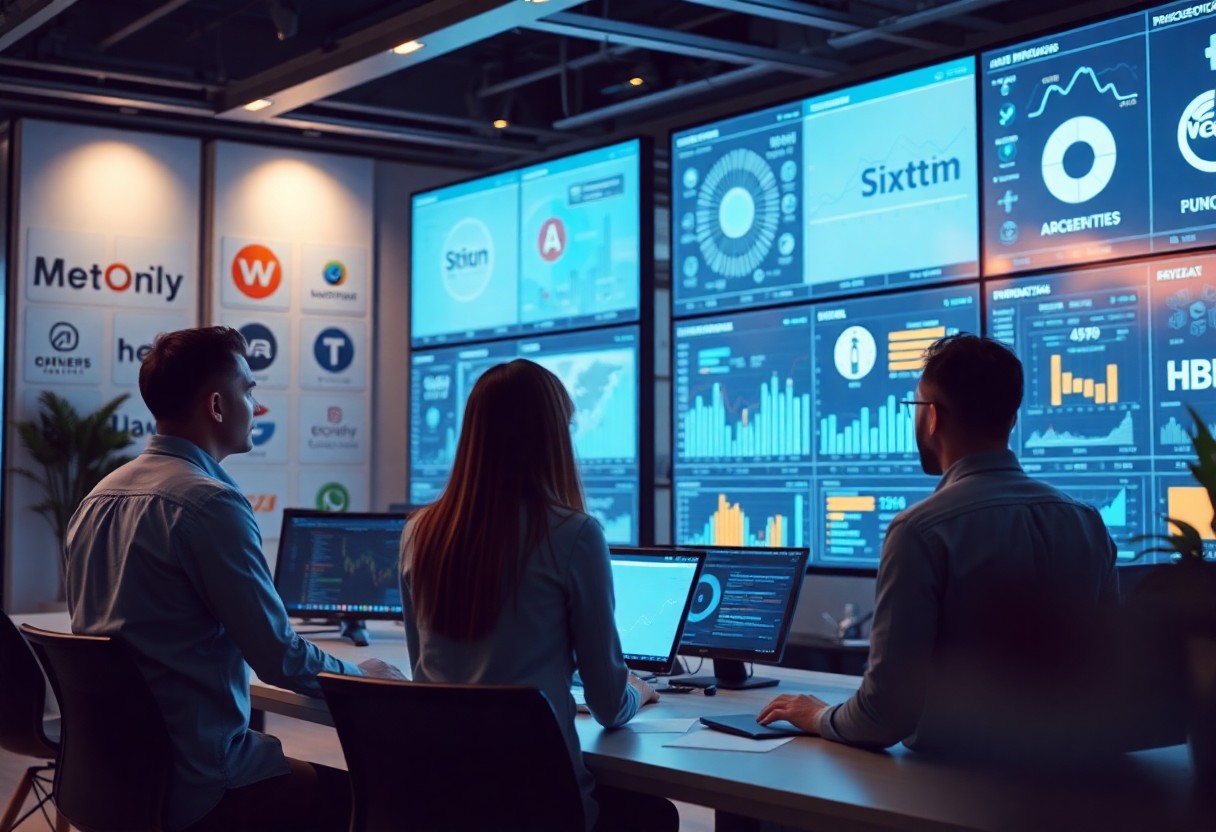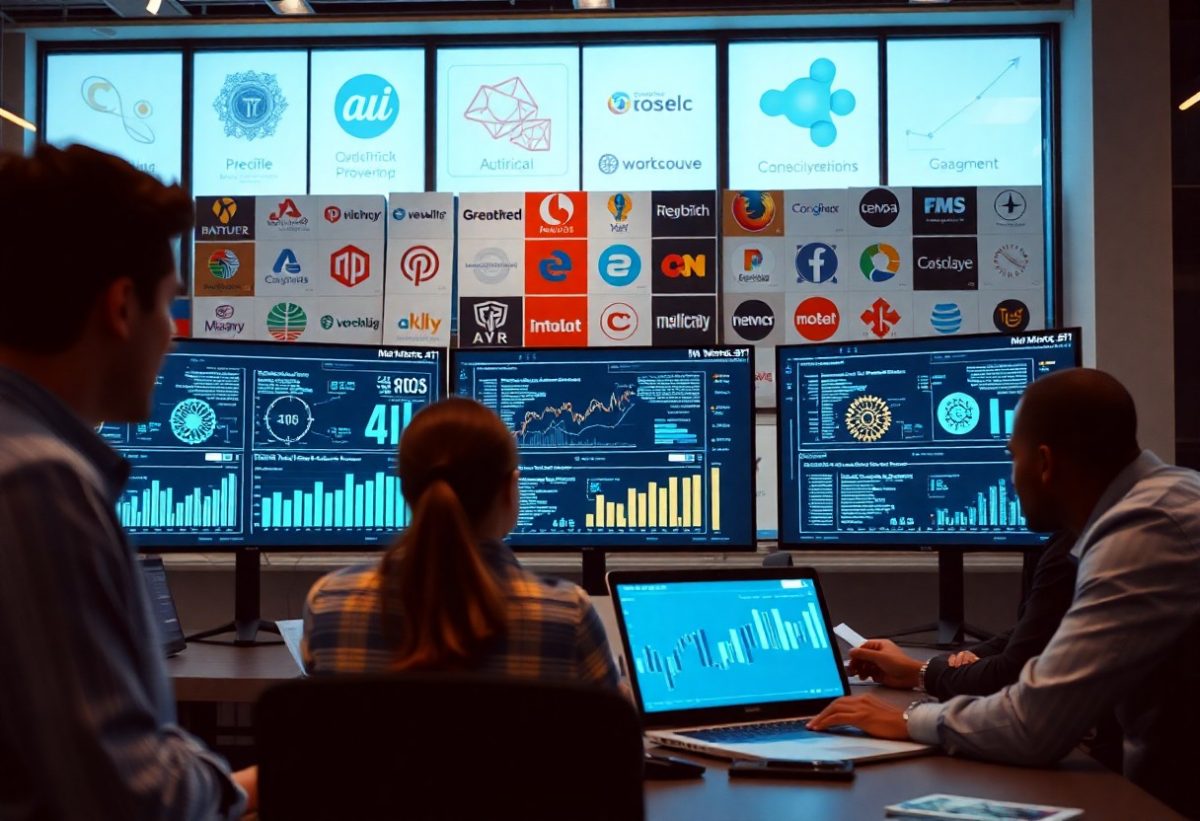Campaigns powered by artificial intelligence have fundamentally transformed how you engage with your audience. By leveraging data analytics, personalization, and automation, these AI-infused strategies allow you to optimize your branding efforts in ways that traditional tactics simply cannot match. You can enhance customer experiences, generate insights into consumer behavior, and fine-tune your messaging to resonate more effectively. As you explore these cutting-edge approaches, you’ll discover how they can significantly elevate your brand’s visibility and connection with its target market.

Understanding AI in Marketing
Incorporating AI into marketing shifts the landscape of how brands connect with consumers. Through machine learning algorithms and data analysis, AI enables personalized experiences, anticipates customer needs, and optimizes campaign performance, paving the way for innovative strategies that outpace traditional methods. By leveraging large datasets, AI insights provide a blueprint for enhancing decision-making processes and targeting precision.
Definition of AI in Campaigns
AI in campaigns refers to the utilization of artificial intelligence technologies to streamline marketing efforts, enhance customer engagement, and deliver personalized content. It encompasses machine learning, natural language processing, and predictive analytics to analyze data and automate various marketing functions, ultimately driving efficiency and effectiveness.
Benefits of AI Integration
Integrating AI into your marketing strategy brings numerous advantages, including improved targeting, increased efficiency, and enhanced customer experiences. By harnessing AI, you can analyze user behavior in real-time, enabling you to craft tailored campaigns that resonate with individuals, resulting in higher engagement and conversion rates.
For instance, brands like Netflix and Amazon utilize AI algorithms to suggest content and products based on user preferences, significantly boosting sales and customer loyalty. AI-driven insights not only help in understanding customer patterns but also forecast trends, allowing you to stay ahead of the competition. Ultimately, this technology transforms data into actionable strategies, maximizing your return on investment while maintaining relevance in an ever-evolving market landscape.

The Shift from Traditional Branding
As the marketing landscape evolves, a significant shift from traditional branding techniques is underway. Brands are increasingly recognizing the limitations of one-size-fits-all strategies, which often fail to resonate with today’s diverse audiences. This shift encourages more personalized, data-driven approaches that leverage advanced technology, offering a more dynamic interaction with consumers that transcends conventional methods.
Limitations of Conventional Tactics
Traditional branding tactics often rely on broad demographics and generic messaging, which can result in disengagement. Campaigns that lack personalization miss the mark, leading to lower conversion rates. Additionally, these tactics frequently rely on outdated data and insights, limiting brands’ ability to respond to changing consumer preferences in real-time. As consumers seek authenticity and tailored experiences, the inadequacies of conventional tactics become increasingly apparent.
Emergence of AI-Driven Strategies
AI-driven strategies are reshaping how brands connect with consumers by enabling hyper-personalized marketing experiences. By analyzing vast amounts of data, AI tools identify trends, behaviors, and preferences, allowing for real-time adjustments in campaigns. This sophistication enables brands to deliver content that aligns closely with individual interests, resulting in higher engagement and loyalty. Companies like Netflix and Amazon exemplify this shift, using AI to curate recommendations that feel intuitive and personalized, thus enhancing the user experience.
With AI technologies such as machine learning and natural language processing, brands can create targeted messages that resonate with consumers on a personal level. For instance, through predictive analytics, you can anticipate customer needs and preferences, tailoring your offerings accordingly. Chatbots enhance customer support, providing immediate responses to inquiries and improving user satisfaction. Moreover, AI can optimize ad placements by analyzing performance data in real-time, maximizing ROI. This proactive approach empowers businesses to stay ahead of competitors while building deeper connections with their audience, fundamentally transforming branding efforts into dynamic, responsive campaigns.
Personalization at Scale
AI-infused campaigns empower brands to deliver highly personalized messaging to vast audiences, creating meaningful connections that resonate on an individual level. By leveraging advanced algorithms, these campaigns analyze consumer behavior and preferences, tailoring content and offers that meet unique needs. As a result, you can expect not only higher engagement rates but also improved customer loyalty, as each interaction feels relevant and timely.
Data-Driven Insights
Your brand can harness the power of data analytics to glean insights from consumer interactions. By tracking patterns in purchase behavior, social media engagement, and online browsing habits, AI tools provide actionable data that informs your marketing strategies. These insights enable you to predict customer needs, refine messaging, and ultimately enhance the effectiveness of your campaigns.
Tailored Consumer Experiences
Through AI, you can develop tailored experiences that cater specifically to individual preferences and behaviors. Custom landing pages, product recommendations, and targeted email campaigns based on past interactions contribute to a cohesive and personalized consumer journey. For example, an e-commerce platform using AI could analyze previous purchases to suggest items aligned with your tastes, significantly increasing conversion rates.
Deepening the impact of tailored consumer experiences, AI allows for dynamic adjustments in real time. If you frequently browse running shoes but abandon the cart, AI can send you a personalized email with a discount or an invitation to a local running event, reinforcing your interests and nudging you towards conversion. Such precise targeting not only enhances user experience but also strengthens brand perception, making you feel valued and understood. By integrating these sophisticated strategies, your brand can consistently exceed consumer expectations in a competitive marketplace.
Predictive Analytics and Consumer Behavior
Leveraging predictive analytics allows you to gain insights into consumer behavior patterns, facilitating data-driven decision-making. By analyzing past interactions and behavioral trends, you can forecast future purchasing decisions and preferences, enabling brands to tailor their strategies effectively. This not only enhances engagement but also drives higher conversion rates as your campaigns resonate more deeply with target audiences.
Forecasting Trends
Utilizing historical data and advanced algorithms, forecasting trends equips you with the ability to anticipate shifts in consumer interests. Identifying emerging patterns allows your brand to stay ahead of the curve, ensuring that your campaigns align with market demands. Brands like Netflix have effectively harnessed trending viewing habits to recommend personalized content, illustrating the impact of timely insights.
Enhancing Targeting Accuracy
Targeting accuracy significantly improves when driven by data-backed predictions. By analyzing customer demographics, purchase behaviors, and engagement metrics, you can refine your audience segments. This ensures your marketing messages reach the right individuals at the optimal time, thereby increasing the likelihood of conversion and fostering brand loyalty.
For example, a study by eMarketer found that personalized ads based on predictive analytics resulted in a 20% higher conversion rate than traditional advertising methods. By integrating AI-driven insights, you can minimize wasted spend and maximize ROI, creating campaigns that resonate well with your audience. Real-time data adjustments further enhance targeting strategies, allowing you to refine campaigns dynamically based on evolving consumer behaviors.
Automation in Campaign Management
Leveraging automation in campaign management allows brands to optimize their workflows and focus on strategy rather than repetitive tasks. By integrating AI tools, you can automate various aspects of your campaigns, including audience segmentation, ad placements, and performance analysis, leading to faster deployment and real-time adjustments.
Streamlining Operations
Streamlining operations through automation means reducing the complexity of campaign management. Tools like AI-driven dashboards enable you to monitor multiple channels and metrics simultaneously, ensuring you can quickly identify trends and make data-driven decisions without the manual overhead.
Improving Efficiency
Improving efficiency becomes achievable when you automate routine tasks and enhance coordination across teams. With AI, you can allocate resources dynamically, prioritize high-performing segments, and eliminate bottlenecks that often slow down campaign execution.
For instance, brands using automated bidding strategies have reported a 20% increase in ROI by ensuring their ad spend is optimized in real-time based on performance data. This allows you to dedicate more time to creative strategies and customer engagement, ultimately leading to improved campaign outcomes and a more agile marketing approach.
Case Studies of Successful AI-Infused Campaigns
Examining real-world applications of AI in branding provides insights into transformative strategies that surpass traditional approaches. The following case studies showcase brands winning by integrating AI technologies into their campaigns, demonstrating the potential for growth and consumer engagement.
- Coca-Cola: Personalized advertising led to a 20% increase in customer engagement.
- Netflix: Algorithm-driven recommendations boosted viewer retention by 80%.
- Sephora: AI-driven chatbot features increased online sales by 11%.
- H&M: AI-assisted inventory management reduced waste by 35% and improved customer satisfaction.
- Starbucks: AI-enhanced loyalty programs resulted in a 10% increase in user participation.
Industry Examples
Brands across various industries are leveraging AI to enhance their campaigns. For instance, Coca-Cola uses AI for targeted ads that resonate with individual preferences, while Netflix employs advanced algorithms for content recommendations, ensuring a tailored experience. Retailers like H&M and Sephora utilize AI for better inventory management and customer interactions, showcasing the diversity of applications in enhancing brand performance.
Measurable Outcomes
Quantifiable results from AI-infused campaigns often reflect substantial improvements in engagement, sales, and operational efficiency. Metrics indicate that adopting AI not only enriches user experiences but also drives financial performance significantly, with many brands reporting double-digit growth within months of implementation.
For example, implementing AI in campaign strategies can lead to enhanced customer engagement metrics, as seen with Coca-Cola’s 20% increase in engagement through personalized ads. Moreover, Netflix’s retention rates, improved by 80% through personalized viewing recommendations, highlight the efficacy of AI in tailoring experiences to individual preferences. Metrics from Sephora reveal that AI-supported chatbots led to an 11% boost in sales, demonstrating a direct correlation between technological integration and revenue growth. These measurable outcomes underscore the transformative potential of AI, reinforcing its value in modern branding strategies.
Conclusion
Now, you can see how AI-infused campaigns revolutionize traditional branding methods by leveraging data-driven insights, enhanced personalization, and real-time adaptability. These campaigns enable you to connect more deeply with your audience, anticipate their needs, and optimize your messaging for maximum impact. By embracing AI technologies, you position your brand at the forefront of innovation, allowing you to stand out in a crowded marketplace and build stronger relationships with your customers.

